 Life & Style
Life & Style

.jpg)
|
| An overview of the Field Restaurant in Võng Nhi Village, Hội An — recognised as the first low-carbon, waste-recycling destination and tour service in the ancient town. — Photo courtesy of EMIC Travel |
By Công Thành
HỘI AN Nestled on the bank of the Đò River in the heart of Võng Nhi Village, the Field Restaurant offers visitors not only a taste of authentic rural life but also a pioneering model of low-carbon, agro-tourism in the world heritage town of Hội An, central Việt Nam.
Managed by EMIC Hospitality, the restaurant embraces the global shift towards sustainable and environmentally friendly tourism. It has partnered with local farmers to promote the coexistence of tourism and organic farming across a two-hectare paddy field in the village, creating a space where nature, culture and cuisine come together in harmony.

|
| A local man prepares a low carbon meal for tourists at the Field Restaurant in the middle of a paddy field in Võng Nhi Village, where organic gardens and trees have been cultivated to reduce carbon emissions..VNS Photo Công Thành |
Local farmers, who had long been familiar with chemical-based rice production, have now returned to their ancestors’ traditional non-chemical fertiliser farming methods and are earning additional income from value-added tourism services on the paddy fields.
A group of 35 farmers in the village were persuaded to join the agro-tourism venture with the Field Restaurant, supplying healthy food to diners while offering rural life experiences featuring traditional farming and gardening practices.
“We provide tourism services based on organic food farming and cooking experiences for tourists as part of a unique hands-on experience. Visitors can enjoy a full-day tour, witnessing how organic farming processes are carried out and how healthy food is prepared for their meals,” said EMIC Travel manager Nguyễn Thị Thanh Thuỷ.
“Farmers host tour, sharing stories of farming life and rural traditions, and cooking meals made from their own harvests. Tourists actively join in farming, gardening, kitchen waste recycling, and energy-efficient cooking activities,” she said.
The manager said the restaurant, which was purposefully built to bend with a nature-based environment, aims to create a low carbon living space by cultivating gardens and green habitat around it.

|
| Tourists take part in farming experiences at EMIC Travel’s garden tour in Hội An — one of the city’s most popular sustainable tourism activities. Photo courtesy of EMIC Travel |
“Healthy herbs and vegetables from the restaurant’s garden are used to prepare quick-cooked dishes that help reduce energy and water use in the kitchen, and tourists can enjoy food made with ingredients from the organic garden,” she said.
Sustainable partnerships
The head of the Thanh Đông Organic Cooperative, Lê Nhượng, said the local farming community has been partnering with EMIC Travel through multi-purpose cooperation to boost sustainable agro-tourism development over the past decade.
“We have supported a mutually beneficial partnership by linking the sale of organic farm produce and farm tour services at the Thanh Đông organic garden since 2015. EMIC sends at least 1,000 tourists to our garden for farming experience tours each year, while consuming around 45 per cent of vegetables and herbs produced by the cooperative,” Nhượng said.
“The cooperative began organic farming on a one-hectare garden and was recognised as the first provider of certified organic vegetables in Hội An. All members of the Thanh Đông Cooperative earn about 30 per cent more than they did with chemical-based farming. We also generate additional revenue from agro-tourism, with around 3,500 visitors per year.”
Phạm Thị Thanh Hiệp, a member of the Field Restaurant, said ‘green’ tourism has been adopted as a key, long-term sustainable solution at EMIC Travel.
She said effective energy use remains a top priority in all processes and services at the restaurant.
“Low carbon emissions, power saving, growing more trees and herbs, and avoiding chemical additives or preservatives in farming and cooking are top priorities for all members of EMIC Travel.
“Healthy home-grown organic herbs and vegetables allow us to cook faster than conventional produce, and every preparation step helps us cut carbon emissions through lower energy use in the kitchen, dining area and coffee shops each day,” she said.

|
| EMIC Travel Manager Nguyễn Thị Thanh Thủy introduces a kitchen waste treatment facility in the Field Restaurant's garden. VNS Photo Công Thành |
Paid off
In 2024, the Field Restaurant officially received the Platinum Gold Low-Carbon Tourism Standard certification from Magnus International, a leading company in environmental project management and carbon offsets, after implementing a sustainable approach based on the 5-R principle – Refuse, Reduce, Recycle, Reuse, and Repurpose – since 2017.
The award recognises comprehensive waste management across all service areas, including waste management training programmes, initiatives to minimise waste and measures to enhance energy efficiency, as well as community-based environmental and livelihood support projects.
EMIC Hospitality, in cooperation with the Environmental Management Fund Foundation and Magnus International Thailand, is working to promote Hội An as a model for sustainable and responsible tourism.
A report from the former Quảng Nam Province (now merged into Đà Nẵng) revealed that Hội An launched the "Zero Plastic Waste Tourism" campaign in 2019, with more than 100 hotels, homestays, villas and restaurants pledging to reduce plastic waste.
The Field Restaurant alone cuts daily environmental waste by 10-15kg through increased recycling of organic kitchen waste, while supplying 30kg of materials each month to produce chemical-free dishwashing liquid.
EMIC Travel has partnered with five other businesses, including Sea’lavie Boutique Resort & Spa, Refillables and La Luna Spa, to pave the way for a sustainable Hội An, promoting efforts among other businesses to reduce single-use plastic by 30 per cent and recycle 50 per cent of organic waste.

|
| A local farmer harvests organic vegetables at Thanh Đông Village, Hội An. Local farmers have been actively participating in eco-tourism and sustainable farming initiatives. VNS PHoto Công Thành |
Emma Novitt, a tourist who joined the low-carbon and waste recycling tour, said: “It was a very well-organised tour with a pleasant cycle ride followed by a visit to a local farm. We were told interesting facts along the way. Highlights included a 20-minute ride in a coracle boat followed by a delicious lunch. We also had the opportunity to cook Vietnamese crepes.”
Hội An, a UNESCO world heritage site, has been transforming into a ‘zero waste’, ‘zero plastic waste’ and organic farming destination, and has become the first eco-tourism urban area in Việt Nam. VNS